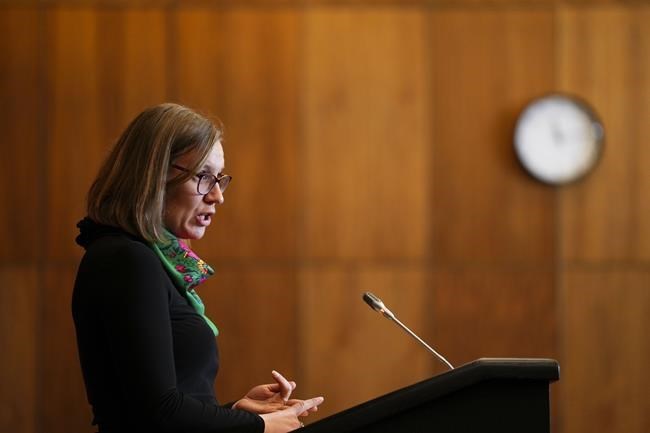OTTAWA — Families Minister Karina Gould introduced legislation Thursday in an attempt to secure a long-term role for Ottawa in daycare and future-proof the Liberal vision of a national child-care system.
The proposed legislation, Bill C-35, sets out the federal government's commitment to long-term funding for provinces and Indigenous Peoples, as well as the principles that will guide those funds. It does not make any specific financial promises.
The Liberal government has brought in a national child-care plan that aims to cut daycare fees by an average of 50 per cent by the end of this year — and down to an average of $10 per day by 2026.
The 2021 federal budget pledged $30 billion in new spending on child care over five years, with another $9.2 billion annually after that.
Enshrining the role of the federal government in the system is one way to make it harder to dismantle should another party win the next election, said Gould.
"We want to protect what we have built," she said at a press conference Thursday.
Conservative Leader Pierre Poilievre has said in the past that his party, if elected, would abolish the existing child-care plan and replace it with a tax credit that goes directly to families.
The Liberal government of former prime minister Paul Martin signed child-care deals with the provinces with the goal of creating a national daycare system in 2005, but Conservative prime minister Stephen Harper cancelled the agreements after he came to power the next year.
A future Conservative government would not be able to abolish the Liberals' new program as "hastily" as Harper did, said Susan Prentice, the Duff Roblin professor of government at the University of Manitoba.
If future governments wish to renege on the long-term commitments proposed in the bill, they would have to take the step of repealing or amending the legislation, Gould said.
"Conservatives wouldn't be able to hide this," she said. "They would have to very publicly tell Canadians that they do not believe in affordable child care."
In an emailed statement, Conservative families critic Michelle Ferreri did not directly respond to Gould's intention to make it harder for her party to scrap the program if it forms government.
She said her party recognizes that families should have access to affordable and quality child care, but said that care is still elusive.
"Despite Liberal promises, affordable child care continues to be out of reach for many Canadian families, as already-long wait lists for child-care spots continue to get even longer," she wrote.
Government officials who provided a briefing on the condition that they not be named said the bill was drafted to respect provincial and territorial jurisdiction and Indigenous rights. They said it does not impose conditions on other levels of government, which was the top concern of other governments during the consultation process.
All provinces appear on track to reduce their child care fees by 50 per cent by the end of the year except for Manitoba, Gould said. That province already has some of the lowest child-care fees in the country, at about $20 per day, and is likely to reach the benchmark by early next year.
Prentice said the bill shows reticence to step too far into provincial jurisdiction.
Any accountability provisions would be part of the individual bilateral agreements signed with each province and territory, which will need to be renegotiated every five years.
"For the moment, that may be the best we've got," she said, but added that she hopes the legislation is continuously improved over time.
"There may in fact be a point down the road where stronger terms and conditions are built in, but for the moment, I still think that it signals a very important sea change."
The fact that fees have already been reduced will make it politically challenging for provinces to walk away from the program after the current five-year term is up in 2026, Gould said.
"They would be leaving a lot of federal money on the table, but more importantly, they'd be leaving a lot of families in the lurch," she said.
The Liberals had promised to introduce the legislation by the end of this year as part of their confidence-and-supply agreement with the NDP, in which the New Democrats have agreed to support the minority government on key votes in the House of Commons to avoid triggering an election before 2025.
That means the bill is all but certain to pass.
If passed, the legislation would also require the minister to report annually to the public about federal funding contributions, child-care accessibility and affordability.
It also legislates the creation of a national advisory council on early learning and child care, which the government announced at the end of November.
NDP families critic Leah Gazan said her party pushed for human rights to be included in the bill. It makes reference to the United Nations Declaration on the Rights of Indigenous Peoples and UN conventions focused on the rights of children, the rights of persons with disabilities and the elimination of discrimination against women.
"I think it's a really strong first step," Gazan told reporters outside the House of Commons on Thursday.
Still, she said the bill is not perfect and she'll be putting forward amendments when the it is reviewed in committee.
This report by The Canadian Press was first published Dec. 8, 2022.
Laura Osman, The Canadian Press



